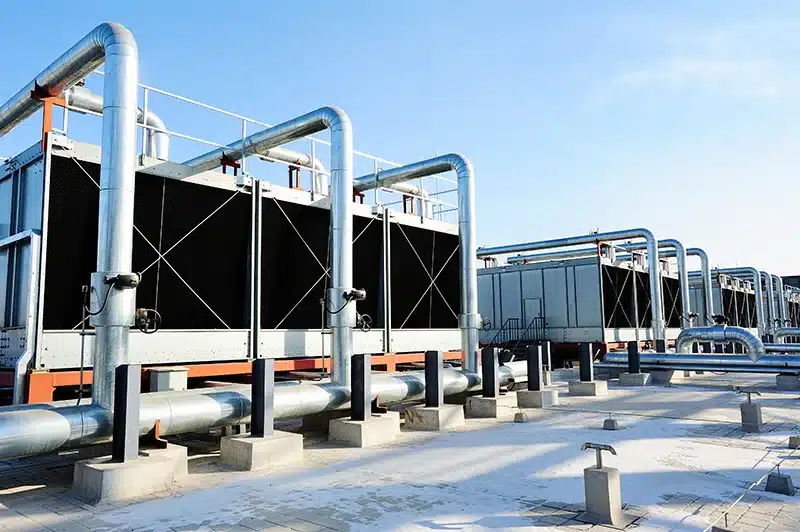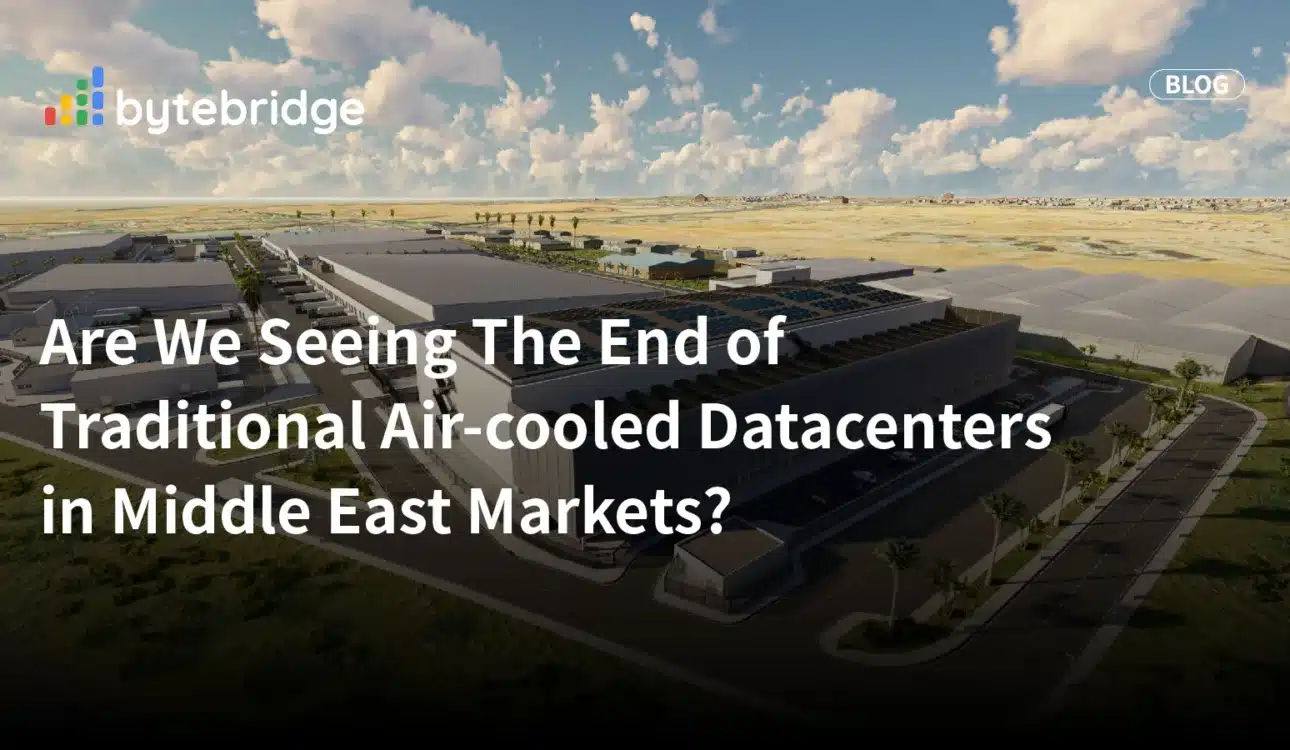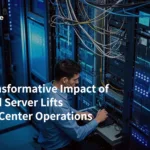Sundeep Raina, Director of Sales, Canada & Middle East at ByteBridge, brings thirty years of ICT business leadership across global markets, with profound expertise in the Middle East datacenter market. For the past 15 years, he has been a driving force at Chatsworth Products (CPI), establishing and managing the company’s Middle East operations and overseeing large, complex datacenter and Smart City projects.
In this blog, Sundeep draws on his extensive experience to explore the future of datacenter cooling solutions in the Middle East.
The need for dependable, sustainable, efficient power and cooling solutions is causing a major upheaval in the Middle Eastern data center business. New benchmarks are being set by the incorporation of renewable energy, the deployment of sophisticated power management systems, and advancements in cooling technology. These trends will be critical in determining the future of data centers as the region makes more investments in digital infrastructure. They will make sure that these facilities can satisfy the demands of an increasingly digital world while still being in line with international sustainability goals.
With power budgets and sustainability being hot topics, cooling the heat loads produced by the datacenters takes center stage. With the prevalent AI/ ML/ Big Data boom, are we going to see the end of traditional Air cooling in the datacenters? This blog provides insight into the potential market trends and patterns associated with various cooling techniques over the next five years in the Middle East markets.
Conventional Data Centers Cooled by Air
In the Middle East, like many other parts of the world, classical air-cooled data centers, along with some form of Aisle Containment, serve as the basis of the cooling infrastructure. The high ambient temperatures sometimes present efficiency issues, however, its established infrastructure and lower initial investment costs keep it appealing. The Middle Eastern market for traditional air-cooled data centers is anticipated to grow, although at a more gradual pace, in contrast to more modern cooling systems. The market is predicted to grow at a CAGR of approximately 7% and is expected to be north of $ 2 billion by 2028 from around $1.5 billion in 2023.

Liquid-cooled Data Centers
Growing popularity as a more sustainable and effective option, liquid cooling is especially well-suited to high-performance computes, and in extremely high-temperature zones. This technique claims to offer better cooling efficiency and lower energy consumption by absorbing and transferring heat away from data center components using liquids like water or specialized coolants. The Middle East’s liquid-cooled data center market is expected to grow dramatically. Various market research companies have predicted that by 2028, this segment is anticipated to grow to USD 1.7 billion with a robust CAGR of around 26%. An increasing need for effective cooling solutions that are capable of handling larger data loads and use less energy is what triggers this rapid increase.

Market Growth Drivers
· Digital Shift and 5G Implementation:
The Middle East’s 5G network expansion along with rapid AI initiatives & digitalization are primary growth drivers. Strong data center infrastructures must be built to manage the increased data traffic and guarantee low latency as a result of these advancements.
· Government initiatives:
Like the smart city projects in the UAE and Saudi Arabia, are driving up demand for modern data centers. The initiatives associated with the goal of building extremely connected communities will produce enormous volumes of data that require effective processing and storage.
· Increasing Investment:
The development of new data center facilities is progressing faster thanks to sizeable investments from both international and domestic players. Many hyperscalers & some AI Startups are increasing their investments in the Middle East region, particularly in UAE, Saudi Arabia & Qatar. The Kingdom of Saudi Arabia for example, has committed to building a national network of large-scale data centers, demonstrating the region’s commitment to growing its data infrastructure.
· Sustainability Objectives:
The adoption of liquid cooling systems is being accelerated by the drive for processor efficiencies. These systems can help meet global sustainability targets, manage more heat-intensive processing operations, and offer increased energy efficiency while potentially providing environmental improvements, making them appealing to enterprises.

Prospects and Barriers
· Skillset:
Specific knowledge and abilities are needed to implement cutting-edge cooling systems. To fulfill these needs, the Middle East is constantly improving its technical personnel, which is both a challenge and a chance for growth.
Exorbitant starting costs compared to typical air cooling, liquid cooling entails greater setup costs initially, but it can offer savings potentially over the years and efficiency. Therefore, there is currently a strong push for its use with AI/ML-driven HPC applications.
· Regulations & Compliance:
As the data center market increases, navigating the regulatory environment becomes critical. The Middle Eastern governments’ growing emphasis on data security and privacy will influence the advancement of data center technologies and operations in the future.
· Warranty Concerns:
The integration of liquid cooling systems comes with the potential challenge of warranty concerns on IT equipment. Although the OEMs are working with liquid cooling providers to address this, the field-integrated solutions need clarity on who owns the warranty.
Over the next five years, the Middle Eastern data center market is expected to see substantial changes, with growth anticipated in both traditional air-cooled and liquid-cooled systems. Particularly liquid cooling is expected to gain traction quickly owing to its efficacy and conformity with ecological goals. With the region’s digital transformation intensifying due to initiatives like 5G deployment and smart cities, there will be an increasing demand for advanced data center solutions.
As a way to effectively cope with future data demands, the datacenters in the Middle East will employ both established air-cooled and developing cooling technologies, as reflected by the strategic investments and support provided by governments in this domain. However, we still need to recognize that with all the advances in liquid cooling, this is not replacing air-based systems.
Why Choose ByteBridge
ByteBridge is geared to help its Middle East & global customers by delivering cutting-edge technologies & solutions to support them in their digitalization and AI readiness endeavors. Our mission is to empower every organization to easily access technology globally, and at ByteBridge, we do that by integrating Datacenter, IT Infrastructure, Cybersecurity, Cloud, and Workplace environments which are backed by professional services and global supply chain services.
About The Author
Sundeep Raina
Sundeep Raina boasts thirty years of ICT business leadership across diverse global markets. With extensive experience in business management, he’s successfully established and transformed operations for two large organizations in the Middle East.
In his role as regional director in Dubai for Chatsworth Products, Sundeep played a pivotal role in securing complex datacenter projects across various sectors. Previously, he led the Cisco distribution business in the Gulf markets, contributing to the establishment of Cisco business units.
An Electronics Engineer with executive management training from the Indian Institute of Management Ahmedabad, Sundeep recently earned Cybersecurity certification from ISC2.









